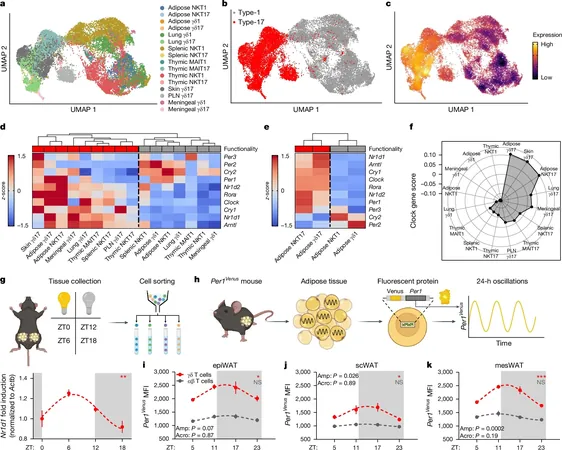
Breakthrough Discovery: Immune Molecule IL-17A Balances Metabolism and Body Clock, Offering Hope Against Obesity!
2024-11-05
Author: Rajesh
Introduction
In a groundbreaking study, scientists have unveiled a crucial link between the immune system and the body's internal clock, shedding light on how this connection influences fat storage and temperature regulation. This discovery holds significant implications, particularly for those grappling with metabolic disorders in our fast-paced, modern world.
The Role of IL-17A
Researchers found that interleukin-17A (IL-17A), an immune molecule found in adipose (fat) tissue, plays a vital role in regulating fat storage. The implications of this finding are enormous—it could pave the way for innovative therapies aimed at tackling obesity and preventing the detrimental effects of metabolic syndromes. Those who work irregular shifts or maintain erratic eating and sleeping patterns may benefit especially from potential treatments that target this immune molecule.
Circadian Rhythms and the Immune System
Circadian rhythms are critical biological processes that follow a 24-hour cycle, governing essential functions within our bodies to align with our environment, such as the natural light-dark cycle. Interestingly, the immune system also adheres to these rhythms, preparing itself to counter infections at specific times throughout the day. Recent investigations have unveiled that the activity of immune cells is crucial not just for defense but also for maintaining tissue integrity, particularly in the gut.
Study Insights
In a study led by Professor Lydia Lynch, published in the prestigious journal *Nature*, the spotlight is on γδ T cells that produce IL-17A. These immune cells were shown to have heightened expression of genes associated with the "molecular clock." This discovery pinpoints how inefficient fat storage can occur when these critical genes are disrupted, leading to metabolic irregularities such as impaired fat processing and temperature regulation.
Importance of Research
Professor Lynch, affiliated with Trinity College Dublin and the Ludwig Cancer Research Institute, stressed the urgency of this research. “In our modern lifestyle, we frequently disrupt natural sleep schedules, which may create an internal chaos affecting our metabolism. What’s alarming is how prevalent obesity has become, affecting numerous individuals, thereby straining health care systems globally.”
Future Directions
The implications extend further: Aaron Douglas, a postdoctoral fellow at Trinity, noted that exploring whether T cells also influence circadian rhythms in other tissues could be a game-changer. If true, this would point to a more complex regulation of body metabolism and temperature, especially fascinating in regions close to the brain that impact learning, memory, and overall metabolic functions.
Conclusion
This research is not merely academic; it offers a beacon of hope for those dealing with metabolic conditions, potentially leading to novel therapeutic strategies. Stay tuned as scientists delve deeper into the role of the immune system in metabolism, as the fight against obesity and its related health challenges might just see a revolutionary shift!




 Brasil (PT)
Brasil (PT)
 Canada (EN)
Canada (EN)
 Chile (ES)
Chile (ES)
 España (ES)
España (ES)
 France (FR)
France (FR)
 Hong Kong (EN)
Hong Kong (EN)
 Italia (IT)
Italia (IT)
 日本 (JA)
日本 (JA)
 Magyarország (HU)
Magyarország (HU)
 Norge (NO)
Norge (NO)
 Polska (PL)
Polska (PL)
 Schweiz (DE)
Schweiz (DE)
 Singapore (EN)
Singapore (EN)
 Sverige (SV)
Sverige (SV)
 Suomi (FI)
Suomi (FI)
 Türkiye (TR)
Türkiye (TR)